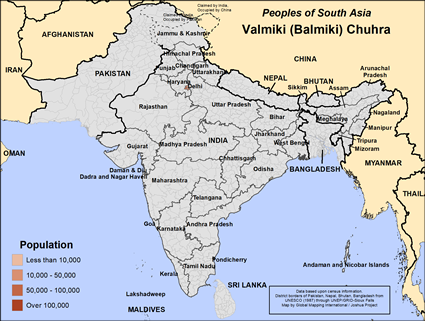Valmiki Chuhra (Hindu traditions) in India

Send Joshua Project a photo
of this people group. |

Map Source:
People Group data: Omid. Map geography: UNESCO / GMI. Map Design: Joshua Project
|
| People Name: | Valmiki Chuhra (Hindu traditions) |
| Country: | India |
| 10/40 Window: | Yes |
| Population: | 594,000 |
| World Population: | 594,000 |
| Primary Language: | Punjabi, Eastern |
| Primary Religion: | Hinduism |
| Christian Adherents: | 0.00 % |
| Evangelicals: | 0.00 % |
| Scripture: | Complete Bible |
| Ministry Resources: | Yes |
| Jesus Film: | Yes |
| Audio Recordings: | Yes |
| People Cluster: | South Asia Dalit - Valmiki |
| Affinity Bloc: | South Asian Peoples |
| Progress Level: |
|
Introduction / History
The Valmiki Chuhra are a community living in Haryana and Punjab states. The traditional occupation of the Valmiki is street sweeping and removing excrement from villages and cities. Since both jobs are considered degrading by other Hindus the Valmiki are outside of the caste system. The main languages of the Valmiki are Eastern Punjab and Hindi. Complete Bibles are available in both languages. The Valmiki are a mostly oral culture so the gospel will have to be shared with them in an audio and visual form.
What Are Their Lives Like?
The Valmiki face many obstacles because of their low status label. Their children are often denied entrance to schools. The Valmiki frequently are not allowed into Hindu temples to worship their Hindu gods. The Indian government is trying to help low class groups by granting them special places in universities and government jobs as a Scheduled Caste. Even if a Valmiki gets an education, he or she be discriminated against at the workplace. The Valmiki continue to work jobs that most Hindu peoples would find beneath them. They clean sewer pipes, collect dead bodies, dig graves and sweep streets. During colonial times many Valmiki left Hinduism and became Sikhs, Muslims and Christians hoping for a better life outside of Hinduism. Valmiki marry within their group. Most other Hindu groups would forbid their children from marrying a person from this group. Marriage to one spouse is the norm. Sons inherit any property that their father has.
What Are Their Beliefs?
The Valmiki practice Hinduism, the ancient religion of India. They worship and serve the gods of the Hindu pantheon. Their Hinduism of the Valmiki is mixed with animism and folk religion. Hindus believe that by performing rituals and good works that they will attain moksha or freedom from the endless cycle of birth, death and rebirth. The Valmiki visit their Hindu shrines and offer prayers, food, flowers, and incense to their gods in hope of gaining protection and benefits. They do not have a personal or familial relationship with their gods like Christians do with their heavenly Father. There are many forms of Hinduism, each with its own deities and beliefs. The main yearly holidays of the Valmiki people are Holi, the festival of colors and the start of spring, Diwali, the festival of lights, Navratri, the celebration of autumn and Rama Navami, Rama's birthday. The caste system divides Hindus into four main categories. Valmiki and tribal peoples are outside of the caste system.
What Are Their Needs?
The Valmiki need education for their children. They need to be treated fairly by Indian government and peoples so they can escape their low status designation and live a decent life. Most of all, the Valmiki need the hope that only Jesus can bring. He alone can forgive their sins and grant them eternal life.
Prayer Points
Pray that Indian believers are willing to love this community and share the good news with them. Pray that the Lord opens the spiritual eyes of Valmiki leaders so they see the light of the gospel of Jesus Christ. Ask the Lord to raise up a Disciple Making Movement among the Valmiki of India in this decade. Pray that Valmiki adults and children learn how to read so they can read the Bible for themselves.